Anam Thubten’s Activities Increase in Northwest
Written by: Ed Bland
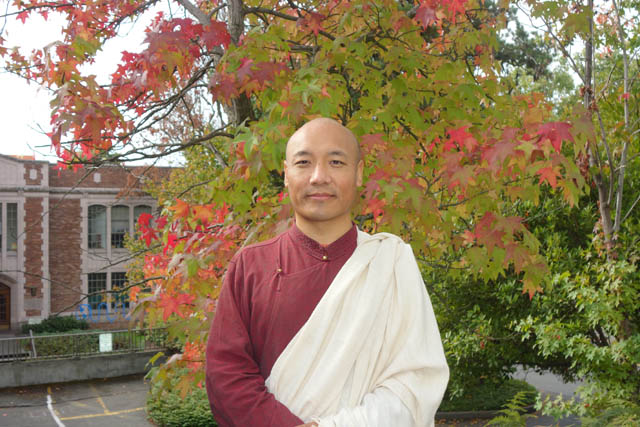
Anam Thubten offered a weekend retreat at the University of Washington for the second time this fall.
Photos by: Ed Bland
Tibetan teacher Anam Thubten and his students are gradually expanding activities in the Pacific Northwest, as interest in his teachings and his unique approach grows.
On Oct. 10 Anam Thubten returned to Seattle to give a dharma talk at Nalanda West, followed by a weekend non-residential retreat at the University of Washington.
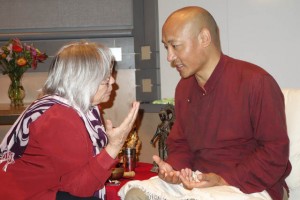
Anam Thubten speaks with student Tanya Schubert of Whidbey Island, north of Seattle.
Approximately a dozen long-time mediators are now meeting every few weeks at the Kirkland home of supporter Phyllis Moses, to watch Anam Thubten’s simulcast teachings from Dharmata Foundation in Point Richmond, California, and engage in a lively dharma discussion afterward.
And next April 28 through May 3, he will offer a five-day residential retreat at Great Vow Zen Monastery in Clatskanie, Oregon, as well as a non-residential retreat in Seattle Feb. 5 through 7, 2016.
Anam Thubten has become so popular that many of his retreats quickly sell out. Thus, a number of participants for the Seattle weekend came from out-of-town, as it is still possible to sit with him here in a relatively intimate setting.
His regional sangha in the Pacific Northwest draws from central and southern British Columbia; Seattle, Tacoma, and Olympia, in Washington state; and Portland and Eugene in Oregon.
Also referred to by the honorary title of Rinpoche, Anam Thubten’s direct, open and authentic style, and his piercing wisdom, have allowed him to cross over many traditionally distinct boundaries or lineages. For example, he now regularly teaches with Vipassana teachers Tara Brach and James Baraz at the Spirit Rock mindfulness center, north of San Francisco, as well as Shambala teacher, Elizabeth Mattis Namgyel, in Colorado.
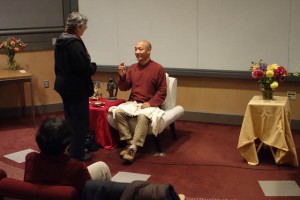
Anam Thubten (seated) discusses the dharma with Susan Dixon (standing).
Anam Thubten grew up in Tibet and at an early age began to practice in the Nyingma tradition of Tibetan Buddhism. Among his many teachers, his most formative guides were Lama Tsurlo, Khenpo Chopel, and Lama Garwang.
Anam Thubten is the founder and spiritual advisor of Dharmata Foundation, teaching widely in the U.S. and occasionally abroad. He is also the author of various articles and books in both Tibetan and English. His books in English include “The Magic of Awareness” and “No Self, No Problem.”
As a teacher, Anam Thubten has a calm, peaceful, and very direct approach. He speaks beautiful English, with a slight Tibetan accent, and has come to fully appreciate the complexity of the Western psyche, and how the dharma can best work with our particular collective consciousness.
He has a delightful and humorous speaking style, is a gifted story teller, and consistently de-constructs the artificial teacher-student hierarchies that can often be accentuated in many traditional lineages. While he is trained in the Nyingma and Dzogchen traditions, he has also adapted his personal style toward our commonality as human beings. One comes away from his talks feeling the audience has made a new friend, one with profound wisdom and compassion.
During his recent Seattle visit, some of the comments overheard were these:
“I have been practicing for many decades, and this was the first time I felt my heart truly open.”
“I didn’t quite know what to expect, so I just let go and relaxed into it. It was lovely!”
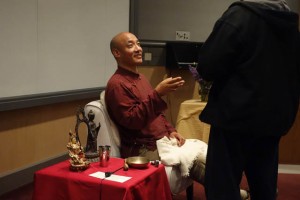
Anam Thubten clarifies a dharma point.
Friday:
The topic of the Friday talk was “the Nature of Happiness,” and Anam repeatedly encouraged the audience to focus inwardly, to examine the mind and its nature, and to trust it as the ultimate source of pure joy, contentment, peace, and true happiness. Over the weekend, Rinpoche went into much greater depth on the distinction between the mind and the nature of mind, pointing out that we are generally lost in the former, while the Buddha encouraged us to explore and abide in the latter.
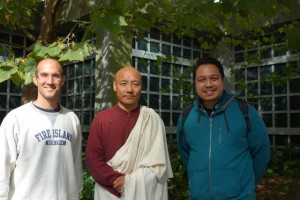
Anam Thubten (middle), with event organizers Ed Bland (left) and Chris Charles (right).
Saturday:
Rinpoche began by describing the famous Nalanda University in northern India, where 10 traditional sciences were taught, such as language, logic, medicine, and the inner science of mind.
All our violence in the world is a manifestation of our mind, he said. When we are controlled by our minds, we will be prone to being irrational, greedy and hateful. Generally, he said, people are lost in their thoughts, and this forms our “collective unawareness.”
He invited people to wake up, to practice and study the inner science of their own minds. And this is done by recognizing and resting in the “pure witness,” another name for our true nature or open awareness.
Rinpoche commented that very few people really take the time to go inside, preferring instead to stay with our limiting belief systems and our ingrained habit patterns. In fact, unawareness is very powerful ground, from which we can cause much suffering to ourselves and others.
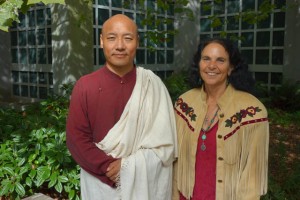
Anam Thubten with event organizer Phyllis Moses.
He encouraged all the attendees to inquire into the mind, to take care of it, purify it, shed old habits, cleanse their hearts, and open to the infinite love and compassion that is their true nature.
On the related topic of anicca (commonly translated as impermanence or change), Rinpoche reminded the audience that we are all dying. In the East, he said, mortality is typically the very first topic of dharma study; that’s the one you meditate on in your most foundational training.
He urged people to make peace with your mortality, and don’t waste their opportunity to wake up.
We must make peace with this reality so we can live our lives fully, without the intense fear that is constantly binding us, he said. We will find both samsara and nirvana in our own minds. He defined samsara as the vicious cycle of suffering, and nirvana as the world of peace and absolute freedom. Both are available with inward awakening or “skavati,” the land of bliss.
Anam Thubten went on to describe the natural states contained within the awakened heart/mind; he specifically gave a lovely twist on the traditional Brahma Vihara instructions:
May you be free from pain, illness and all forms of suffering. (compassion)
May you be peaceful, safe, healthy and joyous. (metta)
May you awaken to your true nature as a sea of infinite love, wisdom and peace. (This was the lovely and unique encouragement to awaken to our true Buddha-nature.)
Rinpoche then continued on an exploration of mindfulness: Rigpa (pure awareness) in his lineage and sati (remembrance) in Pali / vipassana lineages.
“Trust your true nature, turn toward it, and the path will be illuminated,” he said. “You will face all your hindrances, all obstacles preventing you from seeing, and these can be discarded. Samsara can be exhausted. We will eventually become completely exhausted by the suffering of our own mind, repeating the same tracks of music over and over, until we are ready to surrender to our true nature. There is huge relief and joy in doing so.”
Sunday:
Anam Thubten said one must go within to discover the truth, the “primordial fortress, the palace of truth – our true nature.” The path is to discover this source, and to abide in it – to become a king or queen of the dharma. You then become the “Dharmakaya,” the embodiment of the truth.
“Rest in the natural state of your own mind. Awakening will unfold on its own. The supreme source will reveal itself to you.”
“Do not modify your mind. Be the pure witness. Do not grasp at anything. Do not push away unwholesome thoughts or cultivate wholesome ones. Rest in the natural state of mind – with no fear.”
Going back to this theme throughout his Seattle visit, Rinpoche encouraged us to practice awareness every day. To look within. To recognize our own darkness, neurosis and ego.
Rinpoche finished the retreat with an overall blessing, bowing to our own Buddha-nature, and sharing the merit of our activities with all beings.
“May we all embrace our finite as well as our infinite, for the benefit of all beings.”
